- Home
- Linda Newbery
The Sandfather Page 3
The Sandfather Read online
Page 3
Hal slunk back into the lounge, feeling bad for eavesdropping, bad that Mum was crying because of him. He wished she wouldn’t - it wasn’t as if he’d turned evil or something, grown vampire teeth or started a career as an axe-murderer. Still, she was making plans for him, plans she hadn’t even mentioned; and it sounded like she wanted to farm him out to her Aunt Jude. Aunt Jude! Hal was outraged. He’d only met her a couple of months ago; he hardly knew her. She was Mum’s aunt, Hal’s great-aunt, so she was old or at least oldish, nearly as old as the grandfather. She lived near the sea, but that was the only good thing to be said. She’d seemed friendly at the crematorium, and back at the house afterwards; but staying with her! Not if he had any say. She’d disapprove of him for getting into trouble; she’d be strict, and keep him indoors, toiling away at his school-work.
And that house! The big old house that belonged to his grandfather. The grandfather who hadn’t wanted anything to do with Mum or Hal, all these years.
Yeah, and that’ll work how? as Luke would put it.
Although he felt like a little kid, admitting it to himself, Hal didn’t want to be separated from Mum, not now. He never had been, for more than a night or two. And now, with her going into hospital - being taken away—
A cold, prickly feeling came over him at the thought of hospital. His one experience of A & E, when he’d sprained his wrist playing in goal, hadn’t been too bad; he’d been treated as a bit of a hero, war-wounded. But sometimes people went into hospitals and didn’t come out.
He thought of his grandmother’s funeral. It had been a very hot day in August, which made it seem odd that everyone was standing about dressed in black, talking in low voices. Hal had never been to a funeral before and was mildly interested; it seemed like something from TV or a film. And he didn’t even know his grandmother, so there was no need to feel sad. What he did know was that she’d gone into hospital for what was meant to be a minor operation, but had died suddenly from heart failure.
Mum was going into hospital for a minor operation. A routine thing. Nothing at all to worry about, she kept telling him; I’ll be in and out, soon back on my feet, a little bit of rest and I’ll be fine.
Yeah, right. His grandmother had probably said that, the day before she died.
Hal slumped in front of the TV, but couldn’t concentrate; instead he went to the window and stood looking out at the street below. He hadn’t thought much about Mum’s operation - just another complication of the week ahead, no more serious than a dentist appointment - but it now loomed larger in his mind than all his other problems put together. What if she died in there - died as suddenly as her mother had, or stayed in hospital, fading and fading like breath on a mirror until she disappeared altogether? How would he manage without her? What if he ended up alone, with no one who cared about him?
He felt as numb and shocked as if it had already happened, so was startled back into the present when Mum walked in. She was smiling, looking relieved.
‘Hal! I’ve just been talking to Aunt Jude. She’s agreed to help us out. You can go and stay with her for the whole fortnight. She’s looking forward to having you.’
‘Stay with your dad?’ Hal blurted. ‘No way.’
‘No, my dad’s not there. He’s gone to Spain for a month. It’ll be just you and Aunt Jude.’
Hal opened his mouth with a new protest, but knew that he couldn’t.
‘Uh,’ was all he said.
4
MARBLES
On Sunday they set off for Ryton-on-Sea. Hal and Mum. Although Mum kept stressing that this wasn’t a holiday, Hal had other ideas. You couldn’t be at the seaside and not feel a little bit holidayish, whatever your reason for being there.
Ryton-on-Sea had always seemed somehow out of bounds, though it was near enough to drive down for a day; Luke often spent weekends there with his dad. Mum had been born in Ryton and had lived there as a girl, so she sometimes mentioned it, but only as a distant place that seemed marooned in the past. Hal had been there only once, for the funeral. If he and Mum wanted a day at the seaside, they’d go to Brighton or Bournemouth, never Ryton.
The exclusion zone around the place was because of the grandparents. Hal knew that much. Mum had no contact with them; hadn’t had anything to do with them for years. They might as well not exist. If it hadn’t been for Aunt Jude, Mum wouldn’t even have known that her mother had died.
‘We had a quarrel, me and my parents,’ was all Mum would ever say. ‘When I was a student.’
And when Hal asked, ‘What about?’ she would only reply, ‘Oh - we just didn’t see eye to eye, that’s all. We couldn’t get on. Never did, never will.’
So what was the point of going to the funeral, then? Hal didn’t get that - but they had gone, all the same. He and Mum went down in the car, Hal feeling dressed up and strange in his school trousers, with a dark jacket and tie borrowed from Claire’s son because he didn’t have anything suitable. He pictured his grandfather as tall, stern and forbidding. He’d have a beaky nose and bushy eyebrows and little sharp eyes like lasers, and he’d hunch his shoulders when he walked. And he’d always wear black, not just for funerals.
It was a bright, blustery day. At the crematorium, bordered by stunted trees through which the sea could be glimpsed, Hal was led up to a smallish, frail-looking man, with sparse strands of hair and a tanned, freckly face. It was Aunt Jude who introduced them: ‘Gerry? Here’s Tina - you know I told you she was coming? And here’s Hal.’
There was an awkward, startled moment when the man seemed to jump and stare, and then he held out his hand to Mum, and she did the same, as if they were going to shake hands like people at a business meeting. It took Hal a few seconds to realize that this was him, Mum’s dad, his grandfather. Yes, he looked like a grandfather; the sort of grandfather someone else might have.
Instead of shaking Mum’s hand, the man took hold of it with both his own, and held tight. ‘Christina, Christina. It’s been a long time,’ he said. ‘Far too long.’
No one ever called Mum Christina. She was always Tina.
‘Yes,’ was all she said. And then, ‘Dad, this is Hal.’
‘Hal,’ the grandfather repeated, and turned to look at him. He reached out and gripped Hal’s hand in a firm, dry clasp. Hal didn’t know what to say, so said nothing while the old man looked searchingly into his face. His eyes weren’t like lasers after all, but watery and sad. ‘My word,’ he said. ‘You’re taller than me already, young man.’
‘Hal’s been wondering what he should call you,’ said Mum.
‘Oh . . .’ The grandfather gave a wobbly smile. ‘Well, my name’s Gerry, but you could call me Grandad, couldn’t you? Do you think you could manage that?’
He must have thought Hal was about eight years old. And Hal wasn’t sure he could call him Grandad, so was glad when a vicar came billowing up and told Aunt Jude that it was time to go into the Chapel of Remembrance. Aunt Jude linked her arm through the grandfather’s, and nodded to Mum to follow. As they walked into a dimly lit interior like a small church, the grandfather turned to Mum. ‘Come back to the house after, you and Hal. You will, won’t you?’
Hal didn’t get this at all: treating them like long-lost relatives, when they lived less than two hours’ drive away. The grandfather hadn’t wanted to be friendly for the whole thirteen years of Hal’s life; so why now? Hal thought he ought to hate him - especially if what Luke said was true - but while he was wondering whether he did or not, they were inside and there was solemn music playing and the service was beginning. The chapel was far too big for the dozen or so people who came in, mostly quite old, all dressed in black. A few were sniffing into handkerchiefs.
Everyone seemed to know what to do and how to behave - as if there were rules about when to stand and when to kneel, when to talk and when to be quiet and mournful. They knew the tunes of the draggy old hymns, warbling and straining for the high notes, or rumbling away at the deep ones. Hal was ill-at-ease with this God stuf
f. Mum didn’t usually do church either, only for weddings, but she was joining in with the hymns and the Amens. And it was weird, because Hal didn’t even know his grandmother, yet his eyes and nose had gone snivelly. He was annoyed with himself; it wasn’t as if she was someone he cared about. The coffin was carried in, decked with flowers. There was a real dead body inside, a body that had been alive and a person, but was now a lifeless lump to be burned after the service, reduced to ashes. And it was Mum’s mum in there. Awesome, really. But imagine if it were someone he knew.
The vicar was talking about someone called Brenda, and it took Hal a few moments to realise that this was his grandmother’s name. At the end of the service, curtains opened and the coffin slid through. As he stretched to see, curious about how that worked, Hal heard someone near him give a gulp. Then there was more music, and Aunt Jude and the grandfather led the other guests slowly down the aisle and outside. In the dazzle of sunshine, Hal saw that the grandfather looked weepy and sort of shrunken. Aunt Jude seemed to be holding him up.
Afterwards, back at the grandfather’s house, people were more cheerful; there was conversation and even some laughing. There were little sandwiches and sausage rolls and iced cakes, and it was a bit like a party. Now the guests were interested in Hal.
‘And this must be—?’
‘Oh, so you’re Christina, and is this your son? Gerry and Brenda’s grandson?’
‘Oh! I didn’t realise . . .’
No one referred to the fact that Mum hadn’t spoken to her parents or set foot in this house for more than thirteen years. But it was one of those times when Hal was conscious that he didn’t look like Mum, and Mum didn’t look like him, and people saw them without realising that they belonged together. And no one else had dark skin, no one at all.
If only he had a dad here as well, it would be clear. For want of a father of his own, he pictured Osman’s, with his glossy dark skin and his brilliant smile and his comfortable manner. Osman was so lucky that sometimes Hal almost hated him. Apart from being liked by nearly everyone, Oz had a proper family and a nice house full of laughter and music and welcome, and a big brother who worked in a record shop. Most of all he had a dad. So did Luke, only Luke’s dad didn’t live at home and of course he wasn’t black. So it was Osman’s dad who Hal pictured now, standing polite and smiling in his best suit.
Yes, that’s my mum, and that’s my dad. Hal wondered what it would feel like to be able to say that.
Now, soon after their first sighting of the sea - cloud-grey it looked now, not sparkling and enticing as it had been on the day of the funeral - they were on the edge of Ryton, heading towards the centre.
‘That’s my old primary school,’ Mum told Hal. ‘So tiny, it seems now!’
He saw red tiles, a window decorated with infant artwork, a playground and car park. It looked small and old compared to the primary school Hal had attended.
‘Did you like school?’ he asked her.
‘Mm, I did,’ said Mum. ‘Can you picture me, skipping along the road in my gingham dress and sandals, with my satchel and my lunch-box and my hair in two plaits?’
Hal couldn’t really imagine Mum as any different from the way she was now: always neatly dressed, with hair styled and highlighted, and careful make-up. She had to have properly done hair, of course, or people wouldn’t trust her with theirs.
She turned left along the sea-front, or what she called the promenade. The road ran alongside a pebble beach, with banks of shingle reaching up to the road. The tide was low, and a few people were walking on smooth sand near the water’s edge, throwing sticks for dogs or huddling into their coats. Sturdy barriers of blackened wood, which Mum said were called groynes, marched down into the sea. The other side of the wide street was lined with shops and bed and breakfast places, an amusement arcade, a fish-and-chip shop, a newsagent’s with stands of postcards outside.
‘Oh, the beaches here are so lovely,’ Mum said. ‘You’ll like exploring. Wonderful sand, at low tide. Wonderful sea, wonderful sky. It makes me realise how I miss it.’
‘Must have been cool, living at the seaside.’
‘Yes. Yes, it was. Oh, look, Hal - there’s Marborough’s, with the FOR SALE signs all over it. It’s sad to see it shut up like that.’
It was his grandparents’ business, Hal knew, which they’d owned for years and years; Mum had driven him past, to show him, when they came down for the funeral. ‘It was quite old-fashioned - the sort of place you could buy golf clubs or a wedding hat or wool for knitting,’ she’d told him. ‘The top floor was toys and games, and there was a sports department, and luggage, and sewing stuff - oh, all sorts of things. But it’s hard for that kind of shop to survive, these days.’
Hal saw the name MARBOROUGH’S DEPARTMENT STORE in gold letters above the revolving doors. Weird, seeing his own name on a shop-front. He’d thought that before and he thought it now.
‘What a shame.’ They’d stopped at red traffic lights; Mum turned to look at the blank windows. ‘It was always part of Ryton, Marborough’s was. I wonder what’ll happen to it now?’
‘Is he rich then, your dad?’ Hal asked.
‘No - not really. Well, richer than us, but that’s not saying much, is it? The shop was making a loss, towards the end. He’ll get the money from the sale, but he’ll probably invest it. Aunt Jude’s taking care of the finances. She’s an accountant.’
‘Does she always live with him, then? Is it her house as well?’
‘No, she’s worked abroad for years and years - in Portugal, then in France. She’s back to stay now, and she’s bought herself a flat, but she hasn’t moved in yet. She’s looking after my dad’s house, while he’s away.’
Hal’s grandfather was in Spain, visiting a friend who lived there. According to Aunt Jude, he’d always been meaning to go, but the grandmother wouldn’t fly, and it was too far to drive. Now he’d gone by himself, for a break. Hal was glad he wouldn’t be there. How could he have stayed with the man who’d been horrible to Mum? Aunt Jude, formidable though she looked, wasn’t that bad. Hal hadn’t spoken to her much, but he had the impression that she was in charge; that the grandfather couldn’t have managed without her, at the funeral or when people came round afterwards.
‘I always got on well with Aunt Jude,’ Mum told him. ‘She used to stick up for me.’
‘About what?’
She put on her vague look. ‘Oh - you know - whenever there was trouble.’
‘School trouble?’ Hal said, thinking of his own.
‘No - I was never really in trouble at school. I mean, well, just family stuff.’
‘Were they strict, then, your mum and dad?’
‘You could say that. In some ways they were.’
‘And what about her? Aunt Jude?’
Mum laughed. ‘Oh, she’ll keep you in order, all right. It’s not a holiday, like I said.’
Still, she’d mentioned the beaches, and exploring. Aunt Jude wasn’t going to keep him shut indoors the whole time, was she? If she tried, he could always escape.
They turned away from the sea-front now, into a quiet road of houses set well back from the street. The gardens each side were bright with berries and autumn leaves; some even had palm trees and spiky plants that gave an exotic, seaside look. It was very different from the road they lived in at home, which was always lined both sides with cars and vans, every parking space hotly contested. Mum turned left again into a cul-de-sac. Hal recognised the house now, at the far end. It had its own driveway and garage, and was sheltered from the road by a high hedge.
Mum pulled into the driveway and parked. Only now did it occur to Hal that this was the last time he’d have her to himself.
‘You, uh - will you be all right next week?’ he faltered. ‘In hospital, I mean?’
Unfastening her seatbelt, she leaned across and hugged him. ‘Yes, Hal. It’ll be fine, really it will. Don’t you worry about me. I’ll phone as soon as I can.’
Reluctantly he
got out of the car and went to the boot for his holdall. The road was so quiet. It wasn’t going to be much fun, stranded here. For two whole weeks. Away from Mum, away from his friends, away from everything he knew.
Aunt Jude came to the door, and kissed both Mum and Hal. At the funeral she’d been smartly dressed in a black jacket and skirt, but today she looked more casual in a bright red sweater and khaki jeans. She’d invited Mum and Hal to lunch; warm delicious smells drifted out to the hall, and music played from the kitchen. With no grandfather at home, and no funeral guests, the house felt different - brighter, airier.
‘I’ll show you your room first,’ Aunt Jude told Hal, after the usual grown-up remarks had been exchanged about the weather and the journey. ‘It’s your mum’s old one.’
Having been so anxious to get here on time, Mum now seemed reluctant. Carrying Hal’s rucksack, she followed Aunt Jude up the stairs, with Hal behind. The house was spacious: wide staircase, high ceilings. There were paintings on the walls, and an open door showed him a bathroom with an expanse of black-and-white floor tiles. Hal’s - Mum’s - room was at the back of the house, looking over the big garden. Besides the bed, wardrobe and bedside cabinet there was a washbasin, a desk with bookshelves above, and a hinged reading lamp.
‘It’s weird, being back in my own room.’ Mum moved around, looking at everything. ‘It’s been redecorated. I had turquoise wallpaper, and posters everywhere. Sting and the Police - I was mad about Sting.’

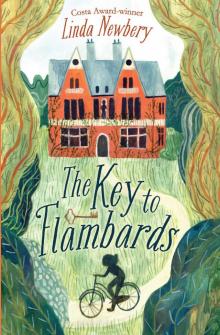 The Key to Flambards
The Key to Flambards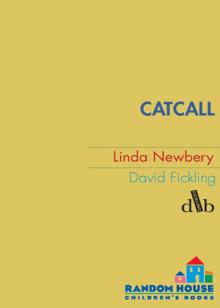 Catcall
Catcall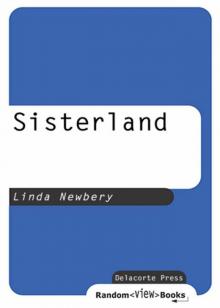 Sisterland
Sisterland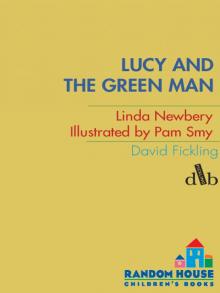 Lucy and the Green Man
Lucy and the Green Man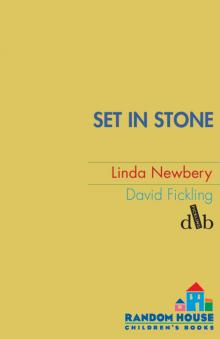 Set In Stone
Set In Stone Lob
Lob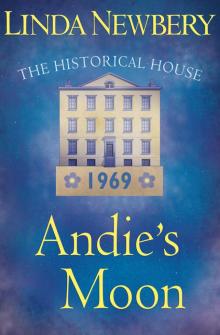 Andie's Moon
Andie's Moon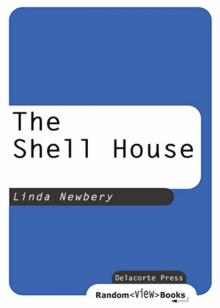 The Shell House
The Shell House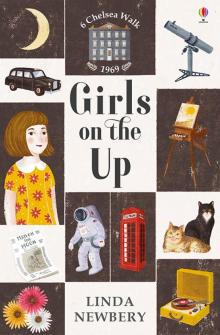 Girls on the Up
Girls on the Up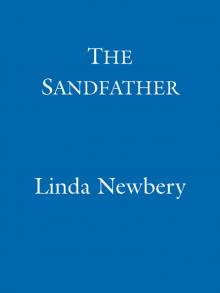 The Sandfather
The Sandfather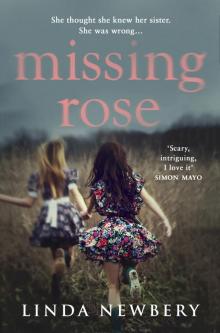 Missing Rose
Missing Rose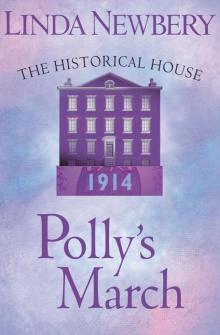 Polly's March
Polly's March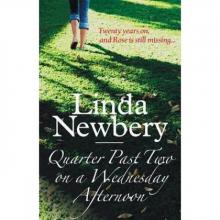 Quarter Past Two on a Wednesday Afternoon
Quarter Past Two on a Wednesday Afternoon Flightsend
Flightsend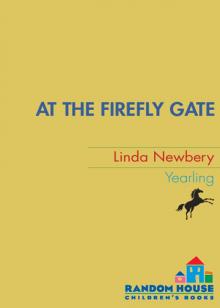 At the Firefly Gate
At the Firefly Gate